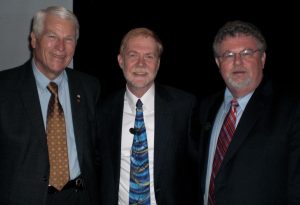Investigative journalist visits UCF
The efforts of one investigative journalist have helped put four Klansmen behind bars for killings committed during the civil rights era.
Jerry Mitchell, a reporter for The Clarion-Ledger in Jackson, Miss., and the recipient of more than 30 national awards for his investigative work, told a UCF audience Tuesday night how he got his hands on sealed documents, spoke with suspects and helped unearth evidence in some of the killings of the civil rights era.
During the speech he gave in the Pegasus Ballroom on Oct. 19, Mitchell said the movie “Mississippi Burning” inspired him to look further into the old civil rights cases.
“I was unaware of the violence that took place,” he said. “It just shocked me. Here were these three kids that were killed by more than 20 Klansmen and nobody had ever been prosecuted for murder in that case.”
Mitchell said he saw the movie in 1989 when he was 29 years old.  Since then, authorities have reexamined 29 killings and made 22 convictions.
Since then, authorities have reexamined 29 killings and made 22 convictions.
His work helped lead to the convictions of Byron De La Beckwith, for the 1963 assassination of Medgar Evers; Sam Bowers, for the firebombing of Vernon Dahmer in
1966; Bobby Cherry for the Birmingham church bombing that killed four girls; and Edgar Ray Killen for the murders of three civil rights workers in 1964.
“The most amazing thing has not been the convictions, but the racial reconciliations,” he said.
Michael Gilmore, a pending journalism major, said he came to the speech to learn more about investigative reporting.
“I wanted to know what obstacles he came into and how he was able to get all the documents that were sealed from the public,” the 20-year-old said.
Other audience members also had asked how he got his sources (many of them suspects in murder cases) to continue speaking to him.
“I kept feeding them,” Mitchell said with a laugh.
People are usually more than willing to talk about themselves, he said. Some of the best quotes he’s ever gotten were not to questions he asked, but rather were just given to him by the sources, Mitchell said.
Mitchell said he also made friends with people who had access to the sealed documents so that they would leak information to him.
However, his reporting of incriminating quotes and information has made him a target, he said.
“This has not been real popular,” he said. “They’re not throwing a parade for me in Mississippi.”
Mitchell has been sent threatening letters and has been a target of intimidation. Mitchell said sources have threatened him and once an editor didn’t want him to write the stories.
But, Mitchell said because of his dedication, he will not allow anyone to intimidate him. He related the threats he’s received to being bullied on the playground.
“I’m not gonna be bullied into not doing something,” he said.
Mitchell said he’s often asked why he doesn’t just leave “these old guys” alone since the crimes were committed over 30 years ago.
“What they don’t realize, these were young killers who just happened to get old,” he said.
Robert Chandler, director of the Nicholson School of Communication, said Mitchell was invited to speak because he represents what someone can do with a degree in journalism.
“He’s not just reported history, he’s changed it,” Chandler said.
Mitchell recently received the Ralph McGill Medal for Courage. He was also awarded a MacArthur Foundation genius grant, Sigma Delta Chi Award for Public Service and the George Polk Award twice, among others.
Mitchell’s speech was part of the College of Sciences’ Distinguished Speakers Series. The College of Sciences, the Nicholson School of Communication, the UCF Alumni Association, and UCF News and Information sponsored the event.
-Article by Samantha Dilday, a UCF journalism student
